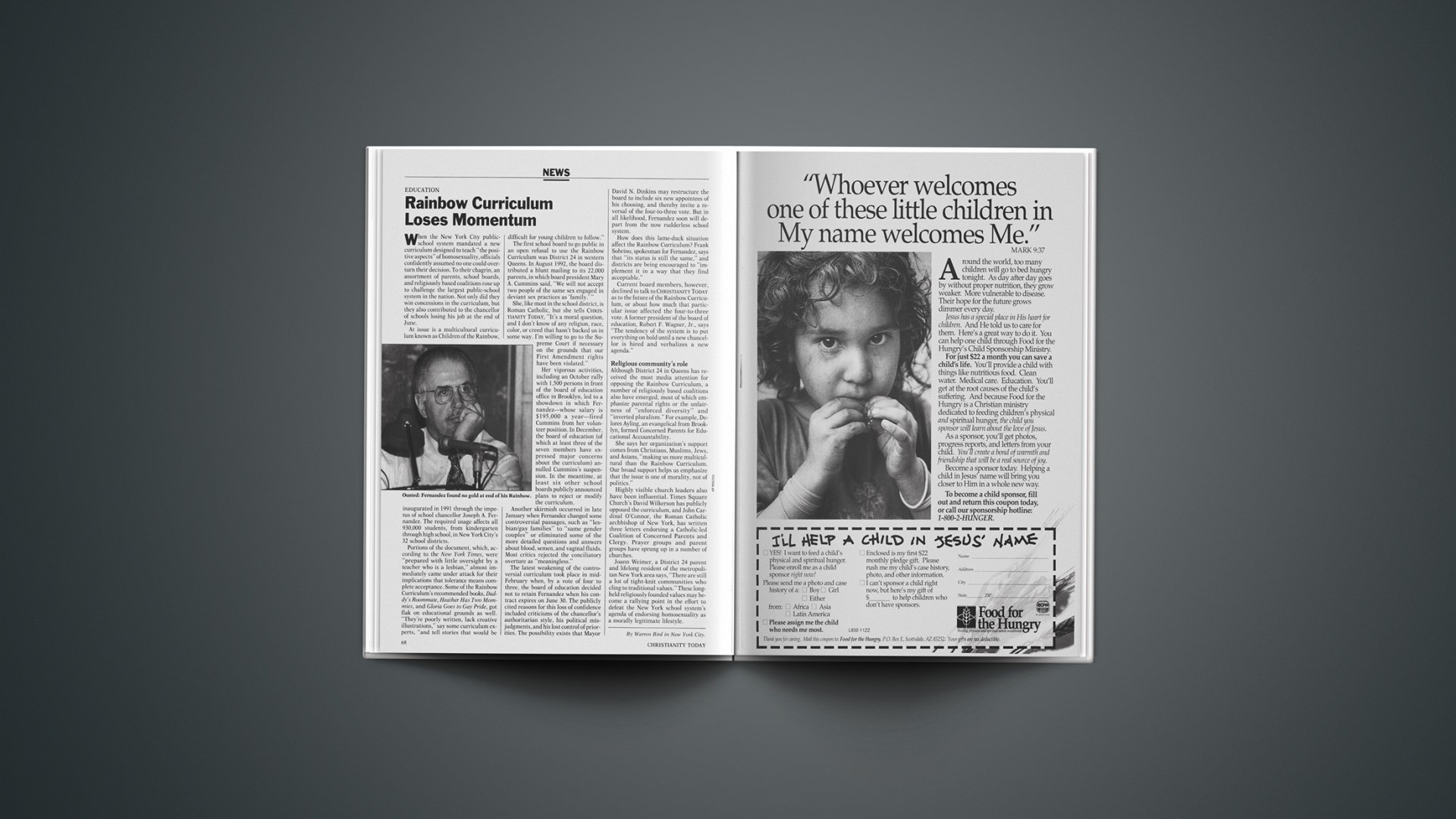When the New York City public-school system mandated a new curriculum designed to teach “the positive aspects” of homosexuality, officials confidently assumed no one could overturn their decision. To their chagrin, an assortment of parents, school boards, and religiously based coalitions rose up to challenge the largest public-school system in the nation. Not only did they win concessions in the curriculum, but they also contributed to the chancellor of schools losing his job at the end of June.
At issue is a multicultural curriculum known as Children of the Rainbow, inaugurated in 1991 through the impetus of school chancellor Joseph A. Fernandez. The required usage affects all 930,000 students, from kindergarten through high school, in New York City’s 32 school districts.
Portions of the document, which, according to the New York Times, were “prepared with little oversight by a teacher who is a lesbian,” almost immediately came under attack for their implications that tolerance means complete acceptance. Some of the Rainbow Curriculum’s recommended books, Daddy’s Roommate, Heather Has Two Mommies, and Gloria Goes to Gay Pride, got flak on educational grounds as well. “They’re poorly written, lack creative illustrations,” say some curriculum experts, “and tell stories that would be difficult for young children to follow.”
The first school board to go public in an open refusal to use the Rainbow Curriculum was District 24 in western Queens. In August 1992, the board distributed a blunt mailing to its 22,000 parents, in which board president Mary A. Cummins said, “We will not accept two people of the same sex engaged in deviant sex practices as ‘family.’ ”
She, like most in the school district, is Roman Catholic, but she tells CHRISTIANITY TODAY, “It’s a moral question, and I don’t know of any religion, race, color, or creed that hasn’t backed us in some way. I’m willing to go to the Supreme Court if necessary on the grounds that our First Amendment rights have been violated.”
Her vigorous activities, including an October rally with 1,500 persons in front of the board of education office in Brooklyn, led to a showdown in which Fernandez—whose salary is $195,000 a year—fired Cummins from her volunteer position. In December, the board of education (of which at least three of the seven members have expressed major concerns about the curriculum) annulled Cummins’s suspension. In the meantime, at least six other school boards publicly announced plans to reject or modify the curriculum.
Another skirmish occurred in late January when Fernandez changed some controversial passages, such as “lesbian/gay families” to “same gender couples” or eliminated some of the more detailed questions and answers about blood, semen, and vaginal fluids. Most critics rejected the conciliatory overture as “meaningless.”
The latest weakening of the controversial curriculum took place in mid-February when, by a vote of four to three, the board of education decided not to retain Fernandez when his contract expires on June 30. The publicly cited reasons for this loss of confidence included criticisms of the chancellor’s authoritarian style, his political misjudgments, and his lost control of priorities. The possibility exists that Mayor David N. Dinkins may restructure the board to include six new appointees of his choosing, and thereby invite a reversal of the four-to-three vote. But in all likelihood, Fernandez soon will depart from the now rudderless school system.
How does this lame-duck situation affect the Rainbow Curriculum? Frank Sobrino, spokesman for Fernandez, says that “its status is still the same,” and districts are being encouraged to “implement it in a way that they find acceptable.”
Current board members, however, declined to talk to CHRISTIANITY TODAY as to the future of the Rainbow Curriculum, or about how much that particular issue affected the four-to-three vote. A former president of the board of education, Robert F. Wagner, Jr., says “The tendency of the system is to put everything on hold until a new chancellor is hired and verbalizes a new agenda.”
Religious community’s role
Although District 24 in Queens has received the most media attention for opposing the Rainbow Curriculum, a number of religiously based coalitions also have emerged, most of which emphasize parental rights or the unfairness of “enforced diversity” and “inverted pluralism.” For example, Delores Ayling, an evangelical from Brooklyn, formed Concerned Parents for Educational Accountability.
She says her organization’s support comes from Christians, Muslims, Jews, and Asians, “making us more multicultural than the Rainbow Curriculum. Our broad support helps us emphasize that the issue is one of morality, not of politics.”
Highly visible church leaders also have been influential. Times Square Church’s David Wilkerson has publicly opposed the curriculum, and John Cardinal O’Connor, the Roman Catholic archbishop of New York, has written three letters endorsing a Catholic-led Coalition of Concerned Parents and Clergy. Prayer groups and parent groups have sprung up in a number of churches.
Joann Weimer, a District 24 parent and lifelong resident of the metropolitan New York area says, “There are still a lot of tight-knit communities who cling to traditional values.” These long-held religiously founded values may become a rallying point in the effort to defeat the New York school system’s agenda of endorsing homosexuality as a morally legitimate lifestyle.
By Warren Bird in New York City










